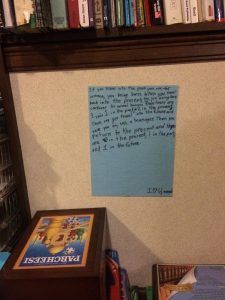I feel a little bit late to the party in terms of book-writing. Everyone else in my family has either written, or co-authored, at least one book. My father wrote a book on his experience with competitive swimming. My sister co-authored several books with my mother in a series that teaches children to improve their handwriting using quotes from influential historical figures. My mother has also independently authored a series of manuals for several versions of Microsoft Dynamics Navision. Heck, even my youngest sister is a published ghostwriter.
I’ve been publishing my writings for about ten years, including these, but all of it has been online. I’ve never experienced the feeling of holding in my hands a book I wrote.
That’s about to change.
The content of my new book is something I didn’t think would ever write about, though it had been sitting in the back of my mind for years. This is because, until a few weeks ago, I didn’t think there would be a market for it.
I was born lacking the machinery that lets people learn social skills naturally. (In short, I’m autistic.) But I was determined to prevent that fact from hindering me, so I spent a decade of my life through my teens working tirelessly on improving my social abilities, until I was not only adequate, but significantly above average. I’ve spoken with Congressional lobbyists and spokespeople, as well as received awards from the Toastmasters Club for public speaking and worked as a salesperson for a year.
Back then, I wished there were a book of all the social rules, so that I could just pick it up and learn. It would have made my life so much easier: most of the non-autistic people I talked to couldn’t actually explain what they were doing in social situations, or why what I was doing was so wrong. There was no such book, so I learned it all myself. Logged it all in my “mental Excel spreadsheet”, as my sister (an accountant) calls it. When I got nearer to the end of my journey, I considered actually writing up all this declarative knowledge about social rules that I’d acquired, but I decided against it: I’m not an expert, not a psychologist, I’m only a lowly autistic person, how could I know enough to write something useful?
(I should have recognized these arguments as what they are – Resistance – but I didn’t, because I hadn’t read The War of Art yet.)
Until recently, all this was just a kooky detail about how I got where I am today. I told friends about it, in conversations about how I see the world, but I didn’t explain it to anyone I didn’t know very well, and I certainly didn’t consider writing any books about it. I didn’t think anybody would bother buying such a book.
But then I moved to San Francisco, where I met dozens of other autistic people. I learned that the wish I’d had as a young person, that somebody would just tell me The Rules, wasn’t unusual at all. Before I left for SF, I figured on some level that people would teach themselves the rules to whatever level they felt was necessary, and so even if I decided to write The Rules, nobody would read it. But in making that assessment, I underestimated the amount I’d been helped by factors outside my control, like having parents who are well-versed in developmental psychology. I failed to consider the idea that maybe other autistic people wouldn’t have spent the time I had on gathering all the data, interpreting and analyzing it, and condensing years of experience in social environments into cohesive explanations of social rules. I failed to consider that they might not know how, or might not know it was even possible.
The thing that made me reconsider was a blog, Autistic Not Weird, run by Chris Bonnello. His posts about the struggles faced by autistic adults made me realize that a book on The Rules wouldn’t be redundant; instead, it could be the first of its kind in a niche market with huge demand and no supply.
I wrote the first draft in 8 days, then tossed it to a group of my friends, who made a slew of edits which added nearly fifteen thousand more words to the length. (A good thing, because I felt the first draft was too short at 25k words.) As they were making edits, I did an oil painting for the front cover, plugged it into Adobe Illustrator as soon as it was dry enough to photograph, and designed the remainder of the cover digitally, adding a back-cover blurb and an “About the Author” section.
In all, the first draft was finished in two weeks. I did this on a short time frame because I had six classes starting at the end of those two weeks, and I knew I would have much less time to write while I was busy taking them.
When I started writing this book, I had considered the idea of getting it from a blank page to publication within the two weeks I had available. I decided, ultimately, that waiting six months to finish the book would improve the end product. The most creative people are not those who precrastinate (rush to complete a task as soon as it’s available), nor those who procrastinate (don’t even start a task until the last minute). There is a sweet spot for creativity where you “procrastinate” just a little bit.
So, now a week into my classes, I’m allowing the passage of time to help my creative process generate new ideas. I’m keeping a list of everything I want to add, and I’ve been adding them gradually as I’ve had time.
I’m setting my goal for publication for December of this year (2020). It feels too far away, like a more reasonable time frame would be two months, but I need to remind myself that the quality of the book is not going to be judged by how long it took me to write it. And, the difference between two weeks and six months of writing time is not going to matter to the people I’m trying to help.
I hope to update this post in December, when I’ve successfully published the book. Here’s to all the work it has taken, and will take, to make that happen!

